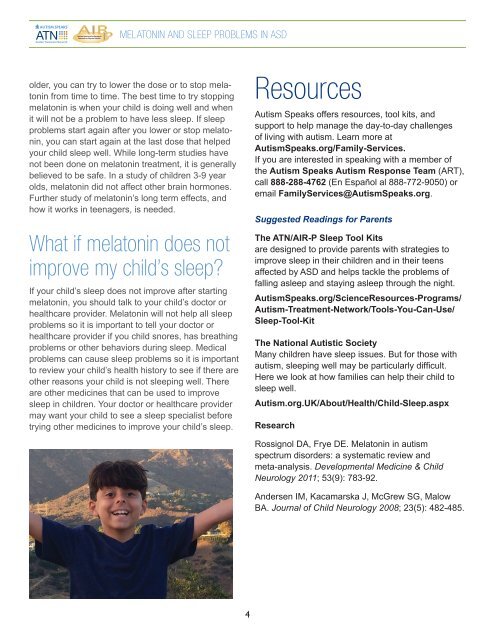Melatonin and Sleep Problems in ASD A Guide for Parents
melatonin_guide_for_parents
melatonin_guide_for_parents
You also want an ePaper? Increase the reach of your titles
YUMPU automatically turns print PDFs into web optimized ePapers that Google loves.
MELATONIN AND SLEEP PROBLEMS IN <strong>ASD</strong><br />
older, you can try to lower the dose or to stop melaton<strong>in</strong><br />
from time to time. The best time to try stopp<strong>in</strong>g<br />
melaton<strong>in</strong> is when your child is do<strong>in</strong>g well <strong>and</strong> when<br />
it will not be a problem to have less sleep. If sleep<br />
problems start aga<strong>in</strong> after you lower or stop melaton<strong>in</strong>,<br />
you can start aga<strong>in</strong> at the last dose that helped<br />
your child sleep well. While long-term studies have<br />
not been done on melaton<strong>in</strong> treatment, it is generally<br />
believed to be safe. In a study of children 3-9 year<br />
olds, melaton<strong>in</strong> did not affect other bra<strong>in</strong> hormones.<br />
Further study of melaton<strong>in</strong>’s long term effects, <strong>and</strong><br />
how it works <strong>in</strong> teenagers, is needed.<br />
What if melaton<strong>in</strong> does not<br />
improve my child’s sleep?<br />
If your child’s sleep does not improve after start<strong>in</strong>g<br />
melaton<strong>in</strong>, you should talk to your child’s doctor or<br />
healthcare provider. <strong>Melaton<strong>in</strong></strong> will not help all sleep<br />
problems so it is important to tell your doctor or<br />
healthcare provider if you child snores, has breath<strong>in</strong>g<br />
problems or other behaviors dur<strong>in</strong>g sleep. Medical<br />
problems can cause sleep problems so it is important<br />
to review your child’s health history to see if there are<br />
other reasons your child is not sleep<strong>in</strong>g well. There<br />
are other medic<strong>in</strong>es that can be used to improve<br />
sleep <strong>in</strong> children. Your doctor or healthcare provider<br />
may want your child to see a sleep specialist be<strong>for</strong>e<br />
try<strong>in</strong>g other medic<strong>in</strong>es to improve your child’s sleep.<br />
Resources<br />
Autism Speaks offers resources, tool kits, <strong>and</strong><br />
support to help manage the day-to-day challenges<br />
of liv<strong>in</strong>g with autism. Learn more at<br />
AutismSpeaks.org/Family-Services.<br />
If you are <strong>in</strong>terested <strong>in</strong> speak<strong>in</strong>g with a member of<br />
the Autism Speaks Autism Response Team (ART),<br />
call 888-288-4762 (En Español al 888-772-9050) or<br />
email FamilyServices@AutismSpeaks.org.<br />
Suggested Read<strong>in</strong>gs <strong>for</strong> <strong>Parents</strong><br />
The ATN/AIR-P <strong>Sleep</strong> Tool Kits<br />
are designed to provide parents with strategies to<br />
improve sleep <strong>in</strong> their children <strong>and</strong> <strong>in</strong> their teens<br />
affected by <strong>ASD</strong> <strong>and</strong> helps tackle the problems of<br />
fall<strong>in</strong>g asleep <strong>and</strong> stay<strong>in</strong>g asleep through the night.<br />
AutismSpeaks.org/ScienceResources-Programs/<br />
Autism-Treatment-Network/Tools-You-Can-Use/<br />
<strong>Sleep</strong>-Tool-Kit<br />
The National Autistic Society<br />
Many children have sleep issues. But <strong>for</strong> those with<br />
autism, sleep<strong>in</strong>g well may be particularly difficult.<br />
Here we look at how families can help their child to<br />
sleep well.<br />
Autism.org.UK/About/Health/Child-<strong>Sleep</strong>.aspx<br />
Research<br />
Rossignol DA, Frye DE. <strong>Melaton<strong>in</strong></strong> <strong>in</strong> autism<br />
spectrum disorders: a systematic review <strong>and</strong><br />
meta-analysis. Developmental Medic<strong>in</strong>e & Child<br />
Neurology 2011; 53(9): 783-92.<br />
Andersen IM, Kacamarska J, McGrew SG, Malow<br />
BA. Journal of Child Neurology 2008; 23(5): 482-485.<br />
4


